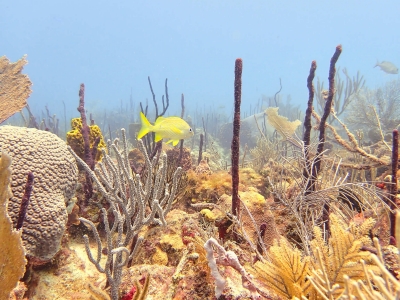A big focus for us at Iberostar is to care for the oceans and protect nature in our destinations, like coral reefs and mangroves. And you can be a big part of this movement too with simple ideas you can bring into your everyday life! Check out a selection we have curated for you:
1. Learn about the oceans (and spread the word). Connecting with the oceans is actually one of the best ways to protect them. By learning more about marine life and why it’s so important for the planet and people, you can make a big difference. Start with some documentaries, series, articles, social media accounts, you name it! Here are some of our favorites. And if you get the chance, travel to destinations where you can discover this breathtaking life and see it in real life. Last, but not least, get your family and friends onboard this collective wave of change.
2. Lower your carbon footprint. Due to climate change, our oceans are warming and have less oxygen. These conditions make it very difficult for marine species like coral reefs to survive. In fact, even if we can get global warming under control by 2050 and only have a global temperature increase of 1.5ºC, we still expect to lose 90% of coral reefs.
As sad as this news is, there is plenty of room for us to help the oceans recover. And one of the ways we can do so is by lowering our carbon footprint. For instance, you can try to reuse things as much as possible. It actually takes a lot of resources and energy from the environment to produce something new, so keeping things in use as long as you can is a very impactful way to help the environment! You can also try environmentally-friendly protein, like plant-based protein and seafood.

3. Choose responsibly sourced seafood. With 70% of the world’s fish stocks fully exploited, consuming responsibly sourced seafood is more important than ever. You can look out for labels, as certified seafood products meet a rigorous standard to ensure they are sustainable from the ocean to the plate. This means they help fisheries recover and support fishing communities. Some of them include the Marine Stewardship Council (MSC) and the Aquaculture Stewardship Council (ASC), Best Aquaculture Practices (BAP), Global GAP and Alaska RFM. You can also check out seafood guides for recommendations of responsible species where you live. Seafood WatchⓇ and WWF’s seafood guides are great places to get started.
4.Avoid food waste. One third of all food is lost or wasted. Given the amount of energy it takes to produce all this food, we can significantly lower the global carbon footprint and therefore help the oceans if we don’t throw it away. A great idea to get started is batch cooking. Many people already batch cook to save on time and not have to prepare meals every day from scratch. We are working on centralizing our kitchens so that multiple buffets can use a larger and more efficient cooking center. Not only is this very convenient, but also great for the oceans. When we batch cook, we can use up fresh products and freeze some portions before they go bad and we have to throw them away. In case you need inspiration, here are 35+ ideas of meals that keep well in the freezer.
5. Participate in citizen science initiatives. There are many organizations around the world that are looking for people interested in helping advance research and conservation for our oceans. Do some research on what activities are taking place at a global scale that you can participate in, or also near you, and get in touch with your local organizations to see how you can contribute!






